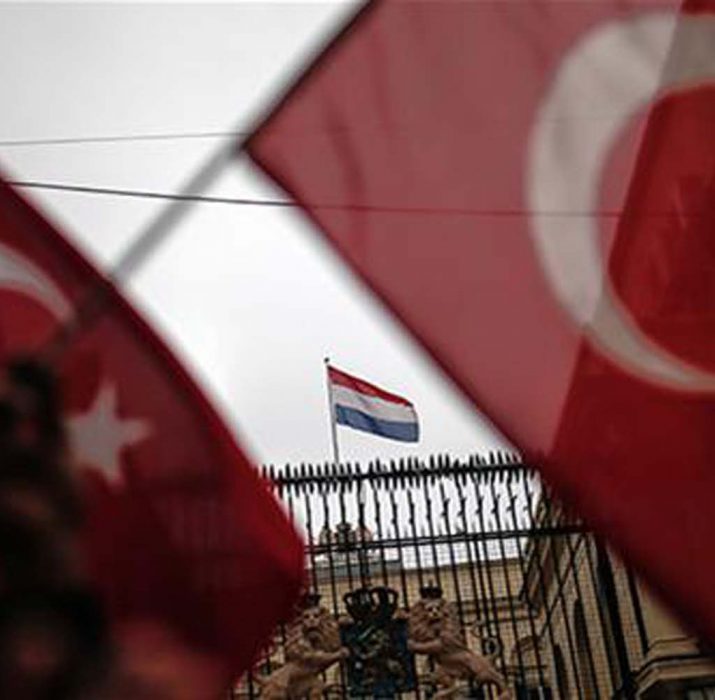Turkey-Netherlands tension rises amid calls for calm
A row between Turkey and Netherlands that escalated over the latter’s refusal to permit Turkish politics to hold rallies in the country has grown after Turkey issued two diplomatic notes to the Dutch envoy in Ankara amid calls from third parties for calm.

A row between Turkey and Netherlands that escalated over the latter’s refusal to permit Turkish politics to hold rallies in the country has grown after Turkey issued two diplomatic notes to the Dutch envoy in Ankara amid calls from third parties for calm.
Turkey summoned the Dutch chargé d’affaires to the Turkish Foreign Ministry for the third time since March 11 to demand an official apology after Turkish Family Minister Fatma Betül Sayan Kaya was prevented from meeting with Turks living in the Netherlands, as well as a comprehensive probe against officers who use “disproportionate” force against Turkish demonstrators.
Foreign Ministry sources said the Dutch Embassy’s chargé d’affaires, Daan Feddo Huisinga, was summoned to the ministry early on March 13 and was given two diplomatic notes regarding the ongoing tension between the two countries.
The first note demanded an official apology from the Dutch government on the treatment shown to Kaya and Turkish diplomats who accompanied her to Rotterdam on March 11. The note stressed the Dutch government’s actions were in violation of a convention from 1961 on diplomatic missions.
The second note claimed that security officials used disproportionate force on protestors and members of the press, while demanding an investigation into the incidents on late March 11 in Rotterdam. It also underlined that Turkey’s right to seek compensation was reserved.
Dutch PM refuses to apologize
Turkish Deputy Prime Minister Numan Kurtulmuş said the Netherlands would be forced to apologize to Turkey for preventing two ministers from holding campaign rallies.
However, Dutch Prime Minister Mark Rutte ruled out any apology for banning Foreign Minister Mevlüt Çavuşoğlu and Kaya from joining pro-Ankara rallies here, while adding that he hoped a diplomatic row could be defused.
“In the interest of our relations within the EU, with Turkey, it is now crucial to try and de-escalate events, not to add to this. Of course, if Turkey continues to talk in an inflammatory way about the Netherlands, we have to consider the next steps,” Rutte said.
In a separate statement on March 13, Rutte said Turkey was not trying to interfere in the Dutch elections by sending ministers to attend a pro-Ankara rally in Rotterdam.
“I don’t believe it was their idea to influence the elections,” Rutte said about the row, which erupted just days before the Dutch go to the polls March 15.
Rutte emphasized that the Turks in the Netherlands were not citizens of Turkey, but Dutch nationals. The Dutch prime minister said he wanted the Netherlands to turn the tide of populism in this week’s parliamentary election.
International community calls for calm
The Council of Europe has urged both Turkey and the Netherlands to engage in dialogue following the row.
“The situation is now damaging to diplomacy and democracy. We cannot allow it to escalate any further,” Thorbjørn Jagland said in a statement on March 12. “All Turkish citizens, inside and outside of the country, should have ample opportunity to be informed about the pros and cons of proposed constitutional amendments and to engage in an open, fair and inclusive discussion in the referendum campaign.”
Jagland also stated all sides should agree on constructive dialogue on campaign events, in this case, Turkey’s April 16 referendum on constitutional amendments.
“All public meetings and political campaigns held in Council of Europe member states should be conducted in accordance with national legislation and the European Convention on Human Rights,” he said.
The EU urged Turkey to avoid “excessive statements” and actions that could increase tensions, in a row with the Netherlands and Germany over the blocking of rallies by Turkish ministers.
“The European Union calls on Turkey to refrain from excessive statements and actions that risk further exacerbating the situation,” EU foreign policy chief Federica Mogherini and EU Enlargement Commissioner Johannes Hahn said in a statement.
NATO chief Jens Stoltenberg also urged Turkey and its NATO allies to reduce tensions stoked by Ankara’s demands that it be allowed to send government officials to rally Turks living in Germany and The Netherlands.
“I will encourage all allies to show mutual respect, to be calm and have a measured approach to contribute to de-escalate the tensions,” Stoltenberg said March 13.
Russia joined the calls for calm as Kremlin spokesperson Dmitry Peskov said, “We call on both the Netherlands and Turkey for calm [to lower] the tension between the two countries.”
Turkey, meanwhile, was criticized by France and Germany over its use of the term “Nazi” to describe the Netherlands actions.
French Foreign Minister Jean-Marc Ayrault said on March 13 that Turkish President Recep Tayyip Erdoğan’s mention of Nazism and fascism in the diplomatic row with the Netherlands was unacceptable.
Meanwhile, the Greek deputy minister for European affairs, Yorgos Katrougalos, lent support to Turkey. “I cannot judge the internal political decisions of other countries, but the rule in Europe is that such meetings can take place,” he said on March 13.
Dutch police moved in early on March 12 to break up protests, which erupted in Rotterdam over the incident, using water cannon, dogs and mounted horseback charges. Dutch media said 12 people were detained and that one officer was hurt.
The Netherlands is home to around 400,000 people of Turkish origin, and Ankara is keen to harness votes of the diaspora in Europe ahead of the April 16 referendum. (Hürriyet DailyNews)









